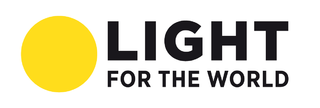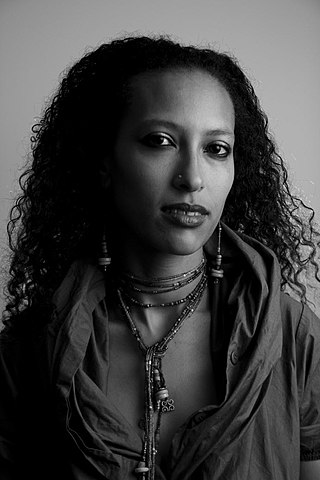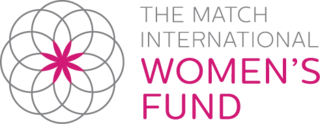Related Research Articles
Women Thrive Alliance, formerly Women Thrive Worldwide and Women's Edge, is a global feminist advocacy network created in 1998 that advocates for gender equality. Working with the grassroots organizations in 53 countries.
The Association for Progressive Communications (APC) is an international network of organizations that was founded in 1990 to provide communication infrastructure, including Internet-based applications, to groups and individuals who work for peace, human rights, protection of the environment, and sustainability. Pioneering the use of ICTs for civil society, especially in developing countries, APC were often the first providers of Internet in their member countries.
The Green Belt Movement (GBM) is an indigenous grassroots organization in Kenya that empowers women through the planting of trees. It is one of the most effective and well-known grassroots organisations addressing the problem of global deforestation. Professor Wangari Maathai established the organization in 1977 under the auspices of the National Council of Women of Kenya (NCWK). GBM's successes in forest conservation, education, and women's economic empowerment have gained the organisation worldwide acclaim. It is also noted for its advocacy of human rights, democratisation of access to public lands, and environmental justice issues such as the role of women's traditional ecological knowledge in addressing environmental degradation and desertification.

Violence against women (VAW), also known as gender-based violence and sexual and gender-based violence (SGBV), are violent acts primarily or exclusively committed by men or boys against women or girls. Such violence is often considered a form of hate crime, committed against women or girls specifically because they are female, and can take many forms.
Population Action International (PAI) is an international, non-governmental organization that uses research and advocacy to improve global access to family planning and reproductive health care. Its mission is to "ensure that every person has the right and access to sexual and reproductive health, so that humanity and the natural environment can exist in balance with fewer people living in poverty". PAI's headquarters is in Washington, D.C.

Light for the World is an international disability and development NGO aiming at an inclusive society. The organisation currently supports more than 258 projects in 20 countries and 2 regions throughout Africa, Asia, Latin America, and Oceania dedicated to the restoration of eyesight, prevention of blindness, rehabilitation of persons with disabilities, inclusive education and promotion of their human rights.

Patricia McFadden is a radical African feminist, sociologist, writer, educator, and publisher from eSwatini. She is also an activist and scholar who worked in the anti-apartheid movement for more than 20 years. McFadden has worked in the African and global women’s movements as well. As a writer, she has been the target of political persecution. She has worked as editor of the Southern African Feminist Review and African Feminist Perspectives. She currently teaches, and advocates internationally for women's issues. McFadden has served as a professor at Cornell University, Spelman College, Syracuse University and Smith College in the United States. She also works as a "feminist consultant", supporting women in creating institutionally sustainable feminist spaces within Southern Africa.
Njoki Wainaina is a gender and development consultant from Kenya. She was the first executive director of the African Women's Development and Communication Network (FEMNET), formed in 1988.
International Day of the Girl Child is an international observance day declared by the United Nations; it is also called the Day of Girls and the International Day of the Girl. October 11, 2012, was the first Day of the Girl Child. The observation supports more opportunity for girls and increases awareness of gender inequality faced by girls worldwide based upon their gender. This inequality includes areas such as access to education, nutrition, legal rights, medical care, and protection from discrimination, violence against women and forced child marriage. The celebration of the day also "reflects the successful emergence of girls and young women as a distinct cohort in development policy, programming, campaigning and research."

The culture, evolution, and history of women who were born in, live in, and are from the continent of Africa reflect the evolution and history of the African continent itself.
The Norwegian Women's Lobby is a feminist policy and advocacy organization in Norway, and is described as the country's "main, national, umbrella organization" for women's rights. NWL is inclusive, promotes intersectional feminism and "works to represent the interests of all those who identify as women and girls." The implementation of the CEDAW treaty is a major focus for NKL, and it works to enhance the implementation, visibility and relevance of CEDAW within politics and society. It states that it "brings together both the key women’s organisations and the leading experts on women’s rights in Norway" and that it has a focus on being a "cooperation partner for the government [and] to contribute to the representation of the Norwegian women's movement in international forums." NWL has stated that "NWL understands discrimination against girls and women in an intersectional perspective and is against, among other things, racism, homophobia, transphobia and ableism. NWL views the anti-gender movement as a grave threat to the rights of all women and girls as well as the LGBTIQ+ community."

Jessica Horn is a Ugandan feminist activist, writer, poet, and technical advisor on women's rights Her work focuses on women's rights, bodily autonomy and freedom from violence, and African feminist movement building. She was named as an African woman changemaker by ARISE Magazine and as one of Applause Africa's "40 African Changemakers under 40". She joined the African Women's Development Fund as director of programmes in October 2015.
Akina Mama wa Afrika (AMwA) (Swahili for "African women") was established in 1985 in the United Kingdom as a small community organisation for African women. It is now an international and Pan-African non-governmental organisation headquartered in Kampala, Uganda.

This is L. Inc. (L.) is a privately held, California based social enterprise and public-benefit corporation that makes organic personal care products. The company has a one-for-one give back model: for every product sold, one is made accessible to a person who needs it. L. has supported a network of over 4,000 female entrepreneurs around the world and is on track to give over 200 million health products. L. is the fastest growing feminine care company in the United States according to the market research group IRI. On February 5, 2019, it was announced that P&G acquired This is L.

MATCH International Women's Fund is a non-profit, non-governmental organization based in Ottawa, Canada. MATCH is dedicated to funding women's rights movements and grassroots organizations working on women's rights worldwide. They have a particular interest in the global South. MATCH was found in 1976 by two Canadian women. Since then, MATCH International has helped women's rights organizations from numerous countries with investments totaling $12 million for improvement of women and girl's rights. In 2013, the organization re-launched under the name MATCH International Women's Fund with the same aim to invest in women and girls in the global South. As the only international women's fund in Canada, their motto is, "Holding Ground and Breaking Ground" on women's, girls', and transgender rights. The organization's funding comes from individual donors, corporate partners, and the government of Canada.

Dalit feminism is a feminist perspective that includes questioning caste and gender roles among the Dalit population and within feminism and the larger women's movement. Dalit women primarily live in South Asia, mainly in Bangladesh, India, Nepal and Pakistan. Dalit women face different challenges than women in oppressor castes in these countries. They are more likely to be poor, uneducated and socially marginalized. Dalit feminists advocate and have advocated for equal rights for Dalit women based on gender, caste and other issues. They have addressed conferences, created organizations and helped elect other Dalit women into political office.
Dr. Aisha Fofana Ibrahim is a Sierra Leonean activist, feminist scholar, researcher and practitioner in Gender and Development.
The Association for Rehabilitation and Re-Orientation of Women for Development, abbreviated as TERREWODE, is a leading Ugandan nonprofit organization. It pioneered best practices for the elimination of obstetric fistula in Uganda over 16 years. The organization focuses on maternal and reproductive health. Headquartered in Soroti, TERREWODE's efforts target the empowerment and education of young women in rural communities. TERREWODE's activism focuses on women's rights to maternal, reproductive and sexual health, as well as the treatment and social reintegration of victims of obstetric fistula.
Feminist foreign policy, or feminist diplomacy, is a concept that calls for a state to promote values and good practices to achieve gender equality, and to guarantee all women enjoy their human rights, through diplomatic relations. The practice was initiated by Margot Wallström, former Swedish Foreign Affairs Minister.
References
- ↑ "Our impact". Womankind Worldwide.
- ↑ "Our impact". Womankind Worldwide.
- ↑ "Our Herstory". Womankind Worldwide.
- ↑ "Our approach". Womankind Worldwide.
- ↑ "Our approach". Womankind Worldwide.
- ↑ "Womankind's aims". Womankind Worldwide.
- ↑ "Impact Report 2016-17" (PDF). Womankind Worldwide.
- ↑ "Focus country: Ethiopia". Womankind Worldwide.
- ↑ "Focus country: Kenya". Womankind Worldwide.
- ↑ "Focus country: Nepal". Womankind Worldwide.
- ↑ Clulow, Mike. "Marginalised women in Nepal are taking their place in local government". Womankind Worldwide.
- ↑ "Digging Deep: The impact of Uganda's land rush on women's rights". Womankind Worldwide.
- ↑ "Focus country: Zimbabwe". Womankind Worldwide.
- ↑ "Our partners". Womankind Worldwide.